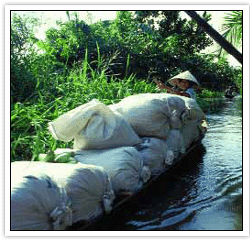Developing a new Strategic Plan 2006-2010

During 2005 a team of consultants spent many months working in close consultation with Mekong River Commission governing bodies, the National Mekong Committees, line agencies, the MRC Secretariat, and our donors and partners to draft a new Strategic Plan for 2006-2010 which will take the organisation forward into a new phase of its growth.
A first draft of this Strategic Plan was approved in principle by the MRC Council on 30 November 2005 and the plan is now undergoing a final consultation process with countries, donors, partners and stakeholders. It is envisaged that once all views are taken into account, the final plan will be approved in the third quarter of 2006.
MRC feels that this consultative process is important and that it will play an integral part of the success of its new strategy. This is, first and above all, a strategy of the member states and, as such, it required intensive discussion and input from the National Mekong Committees (NMCs) and their line agencies as well from MRC Secretariat. Comments have been sought from donor groups and stakeholders and these are being incorporated in what the MRC sees as a dynamic and forward-thinking strategy for a modern River Basin Organisation.
According to the 1995 Agreement, MRC's mandate is to promote "Cooperation in all fields of sustainable development, utilisation, management and conservation of the water and related resources of the Basin". Now 10 years on, and with considerable financial and technical assistance from donors, the MRC has made substantial progress in implementing the 1995 Agreement. It has acquired a strong reputation as one of the most efficient international river basin organisations in the developing world, with established and effective links to its member countries through the NMCs.
The MRC Secretariat has developed an impressive knowledge base and powerful mathematical models to help it achieve its mandate of promoting cooperation and regional integration and this knowledge will provide the MRC's governing bodies with the tools they need for well-informed basin-wide development planning and decision-making.
During discussions, the MRC member countries expressed their desire to see the new Strategic Plan emphasise the production of tangible results focused on poverty reduction through sustainable development; increased ownership of the MRC and its programme work and the adoption of an integrated water resource management approach to the utilisation of the Mekong's common resources.
The Strategic Plan 2006-2010 plan is based on an analysis of the socioeconomic situation of the basin and its important development and environmental protection needs as identified by the member countries and relevant stakeholders. This process enabled the MRC to clearly define its role and set its goals, objectives and priority actions for the next five years.
The overall five-year goal of the MRC is: More Effective Use of the Mekong's Water and Related Resources to Alleviate Poverty While Protecting the Environment.
During 2006-2010 the MRC will work to ensure development is conducted in a manner that optimises the multiple-use and mutual benefits of all riparians while keeping potential harmful effects to a minimum and emphasising the needs of the poorest and most vulnerable communities, such as those on the floodplains, or farming in the dry regions and the Delta.
The MRC has identified four areas on which to concentrate its efforts over the next five years. If it is to achieve its aims, the there is a need to sustain the current strong commitment from the member states, donors and stakeholders as well as the mobilisation of funds in support of the MRC's work programme and activities.
The MRC will work towards:
- Promoting and supporting coordinated and sustainable pro-poor development of the basin's water and related resources.
- Enhancing effective regional cooperation between member countries.
- Strengthening basin-wide environmental monitoring and impact assessment.
- Strengthening the integrated water resources management capacity and knowledge base of the MRC bodies, NMCs, Line Agencies, and other stakeholders.
The MRC supports the Mekong Programme, a Regional Cooperation Programme for the Sustainable Development of Water and Related Resources in the Mekong Basin. This is a programme owned by the member countries, but MRC can play a critical role in lending guidance and support to its members by providing the knowledge and expertise to promote cooperation and regional integration for sound, sustainable developments that are pro-poor, environmentally sustainable and based on fruitful cooperation between the Mekong countries.
The extensive consultations within the MRC member states showed that promotion of regional cooperation for sound sustainable development is considered as one of the most valuable services the MRC can offer to them. However, the MRC should only act to fill a gap where member states agree that action at regional level would provide real value-added to actions at national and sub-national levels.
With this new Strategic Plan, MRC is confident of becoming a real country-driven international river basin organisation, able to play a leading role in regional integration and cooperation for the coordinated sustainable development of the Mekong River Basin.
Compared with international rivers in most developing countries, there is a substantial level of concrete regional cooperation in water related sectors in the Mekong and this continues to grow fast. Of course, there is more to be done and what is already quite effective in areas such as navigation, fisheries, flood management and environment monitoring should be extended to the use of water for irrigation and hydropower, where regional cooperation can still be enhanced. Cooperation with upstream countries also needs further development, although significant steps have been achieved recently.
With the generous support of our donors, MRC will continue to strengthen its capacity to agree on common plans for long-term and integrated developments, to address transboundary issues with a trusting spirit of cooperation, and to promote environmental and social awareness to ensure sound protection of the river as well as the livelihoods of the poorest and most vulnerable communities in the basin.
Choose a newsletter: